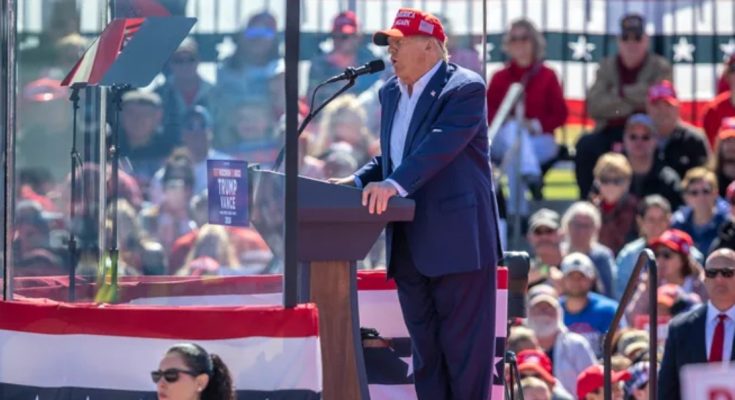Donald Trump delivered one of the strangest and most unhinged speeches of his political career in Mosinee, Wisconsin. His address was riddled with bizarre references, disjointed thoughts, and a series of false claims that left many attendees and viewers bewildered. As he rambled on, Trump’s rhetoric veered wildly from discussing his political platform to bizarre comparisons with notorious figures like Hannibal Lecter and Al Capone.

During his speech, Trump mentioned “wise guys” in the audience and bizarrely linked them to Hannibal Lecter, the fictional cannibalistic serial killer from “Silence of the Lambs.” He claimed, “Dr. Hannibal Lecter will have you for dinner,” a statement that seemed to confuse and amuse the crowd in equal measure. This odd reference was just the tip of the iceberg. Trump then proceeded to assert that he is statistically a worse person than Al Capone, a notorious gangster known for his violent life. “According to the statistics, I am a much worse person than Al Capone,” he proclaimed, leaving many to wonder what statistics he was referencing.
One of the more alarming segments of Trump’s speech involved his assertions about children in schools undergoing gender reassignment surgeries without parental consent. “Can you imagine your son leaves the house and comes back with a brutal operation?” he asked, painting a nightmarish scenario that has no basis in reality. This inflammatory rhetoric is indicative of a broader trend among some politicians to exploit fears surrounding education and gender issues for political gain.
Trump’s economic claims were equally dubious. He announced plans to transform the U.S. into a “tariff nation,” suggesting that it wouldn’t cost Americans anything. “I’m not raising your taxes; I’m raising China’s,” he declared, a statement that contradicts basic economic principles and the realities of international trade. In stark contrast, recent reports from Goldman Sachs indicate that the economy would fare better under Vice President Kamala Harris than under Trump, a fact he conveniently ignored.
As is typical for Trump, he launched into a tirade against the media, labeling them as a “threat” to the country. He struggled to remember names, fumbling through his speech and awkwardly greeting a journalist named Brian. Additionally, Trump proposed modifying the 25th Amendment to allow for the impeachment of a vice president who lies or engages in conspiracies, a move that many saw as a thinly veiled attack on Harris.
His claims escalated to apocalyptic predictions, suggesting that if he does not win the election, “there won’t be an Israel” and that the country could face dire consequences. “This may be our last election,” he warned, a statement that echoes his previous rhetoric about election integrity and voter suppression.
Throughout the speech, Trump made numerous false statements, including an erroneous claim about the unemployment rate, stating it was at 7.9% when it was actually around 4.2%. His comments about gun rights were also contradictory, as he stood in front of bulletproof glass while discussing the Second Amendment. Moreover, Trump perpetuated false narratives regarding crime rates among migrants, claiming they were at “levels never thought possible.” He even referenced a fabricated story about Venezuelan gangs taking over apartment complexes in Aurora, Colorado, which local authorities have debunked.
As Trump concluded his speech, it was evident that he is increasingly relying on outlandish claims and fearmongering to rally his base. The bizarre nature of his remarks has raised concerns not only about his grasp on reality but also about the implications of such rhetoric on the political landscape. His speech in Wisconsin serves as a stark reminder of the volatility within American politics and the lengths to which Trump will go to maintain his influence.



